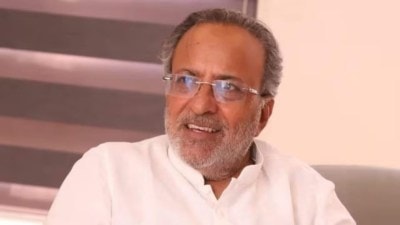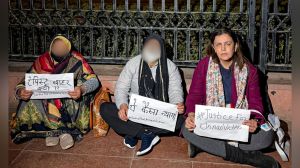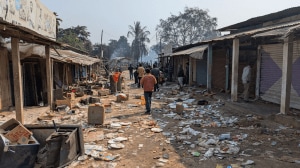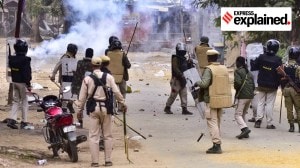Looking glass
The customer is not always rightIndians we were told were fatalistic people. A people that looked at both good fortune and bad as nothing ...

The customer is not always right
Indians we were told were fatalistic people. A people that looked at both good fortune and bad as nothing but a gift of the stars. A people who, believing that fate was delineated in neat lines on a palm, felt there was nothing to be done about it. It is time perhaps to junk that perception.
Last week, in a skirmish between two schoolboys, one punched the other in the stomach. There was no known enmity between the two, in fact the two were friends. Yet the scuffle common enough between young boys and provoked by some teasing about a haircut resulted in one falling down, hitting his head on the floor and sustaining a fatal injury. A freak accident one would have thought, a suitable case for fatalism if there was one. Except that a few days later the unfortunate boy8217;s family was in the papers alleging that negligence on the part of the school authorities had led to death. A compounded tragedy? Not if you believe the school authorities who strongly denied theallegation and the police, which dismissed it as nothing more than an emotional outburst8217; on the part of the bereaved family.
Understandable, one would think, under the circumstances, but it does make one wonder: Are we turning into a society that is quick to blame?Over the last few days the news has been all about the hijack crisis with images of relatives and friends of the ho-stages attempting to storm government parleys and making furious demands for the release of their loved ones before mike-wielding reporters. It is reminiscent in some ways of Kargil. Of the emotion filled funerals of martyred soldiers, of the headlines of the times. And, though the parallels may not be apparent of the Orissa cyclone. It seems as if we have had a surfeit of crises over the last six months. And equally what we have had a surfeit of are complaints against those in charge: complaints about mishandling and delays, complaints about the absence of snow shoes and inadequate weaponry, complaints about administrativebumbling, of callousness, negligence and confusion.
These complaints are not new. Check out the editorials in any newspaper on any day of the last few decades and the adjectives will probably spring off the page. But now, thanks largely to the impact of television, they are being voiced not in the measured tones of the leader writer but in angry denunciating terms by the public. In fact vox populi is occupying greater space and wielding more influence in the handling of national crises than ever before. And the most noticeable quality of this people8217;s participation is that it is driven strongly by sentiment coupled with a new somewhat militant customer is always right8217; attitude.
One would assume that the involvement of common people in decision making can only be described as a good thing. Yet there are certain characteristics about this emerging phenomenon that need a closer look. The first thing that comes to mind is the unspoken yet widely accepted division of society into authorities8217; and ordinarypeople. Regardless of the fact that both are drawn from the same community and are subject to the same lax standards, there is an assumption that the former is somehow much more irresponsible.
To draw a stray parallel: a man who builds a shaky mezanine or stores hazardous chemicals in his garage would still feel completely justified in railing against poor security at the airport for instance.
The other factor that seems to characterize public censure these days is the lack of context. So the issue of cuts in defence spending can be raised during Kargil with no concept of a limited kitty and the need to spend on other pressing needs. Similarly the hijacking of a plane can be viewed solely as a one-time humanitarian issue, as it was in the first two days of the crisis, with no connection to the backdrop of rising Islamic fundamentalism and the stepped-up threat of terrorism. Nor did all the hand wringing over Orissa ever convey that at the best of times it is an underdeveloped and badly administeredstate. The problem with this disconnection is, of course, that it makes solutions appear far more simple than they really are. Nothing worse, to take the customer simile a little further, than a faulty television set that the company is duty bound to fix.Apart from the fact that it introduces a new and not always healthy pressure on those in power it could make for less accountability than more.
The reason for this is the sporadic nature of this TV-spawned public involvement. Those at the receiving end can always argue that the urgent, harried environment of a crisis is not the best time for a serious post mortem. And oddly enough once the critical times have passed the public finger too appears to curl back into itself. Kargil provided a good example.
Despite all the brouhaha about soldiers8217; widows and inadequate compensation and so on, nobody has yet pressed the ruling party for an answer on the lapses that allowed the invasion to occur in the first place. We may never be a quick to litigate society inthe manner of the United States 8212; the slow state of affairs at the courts rules out that possibility. But we are getting there in inclination. It may yet be the beginning of responsible public participation. But for the moment it seems as if we need to temper blame with some of our old fatalism. Bad things sometimes do just happen.
- 01
- 02
- 03
- 04
- 05































